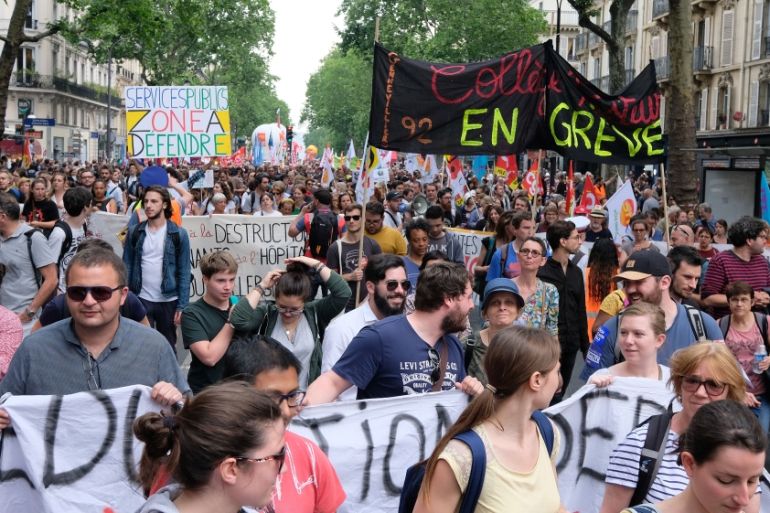Thousands of public workers protest against Macron’s reforms
Emmanuel Macron, who plans to cut 120,000 public sector jobs, is on a collision course with France’s trade unions.

Paris, France – Under a stormy sky, more than 15,000 public sector workers have marched across the French capital to protest against President Emmanuel Macron’s planned economic reforms.
A united front of teachers, police officers, transport staff and air traffic controllers rallied on Tuesday, carrying banners and placards condemning a government they say is bent on destroying workers’ rights while targeting people who are already underpaid and overworked.
Keep reading
list of 4 itemsGabriel Attal becomes France’s youngest prime minister
Macron says protecting civilians ‘non-negotiable’ at Gaza aid conference
Macron visits Kazakhstan on strategic tour of Central Asia
“We have to fight not just for ourselves but for everyone because the government is hurting the public sector,” a protester said.
“So we’re fighting for France’s vital public services.”
Macron wants to cut 120,000 public sector jobs to help streamline public services, reduce debt and create new opportunities.
Elected last year as a reformer, he is forging ahead with his ambition to transform and modernise France.
The protests, he says, will not make him change his plans. It’s a position that has put him on a collision course with France’s trade union leaders.
![The protests have been frequent but the number of participants is low compared to rallies in previous year [Christian Hartmann/Reuters]](/wp-content/uploads/2018/05/3c9bdf21ef4f42d0b9fb163b67cc62aa_18.jpeg)
Since March, several unions have led the almost weekly strikes that have seen public sector workers walk out and transport disrupted.
The unions’ anger was triggered by Macron’s decision earlier this year to reform the debt-ridden national railway, or SNCF – long a bastion of French trade unionism. The president’s push to overhaul public services has only added fuel to their fire.
“The unions are supporting all public sector workers,” Pascal Pavageau, head of the Force Ouvriere labour union, said at the Paris demonstration.
“We’re also here to send the message that the sort of politics that favours only 10 percent of the population, those who already have everything, to the detriment of the other 90 percent has to stop – the inequalities must end,” he said.
Macron’s face-off with the unions has prompted many analysts in France to call it the president’s biggest test yet.
If he fails, he will not be able to press ahead with the remainder of his sweeping reform agenda. But to win, he needs to beat the unions – and in France that is no easy task.
![A demonstrator carries a placard that reads, 'Public service, My Love' [Christian Hartmann/Reuters]](/wp-content/uploads/2018/05/868e1ab415cc4c8bada10f1d58cb18ab_18.jpeg)
For decades, French unions have been a mighty force. In 2006, they forced then-President Jacques Chirac to abandon new job contracts for young people.
In 1995, nationwide strikes forced the conservative leadership to scrap a raft of reforms.
It was the biggest social movement since May 1968 when workers and students nearly brought down the government of President Charles de Gaulle.
Several of Macron’s predecessors have attempted to overhaul the SNCF, only to crumble in the face of stiff union opposition.
But it seems that history is not about to repeat itself.
Macron looks on track to win his battle, with momentum being on his side. The protests have been frequent but the number of participants is low. Tens of thousands of people is a far cry from the millions that hit the streets in 2009 to protest against then-President Nicolas Sarkozy’s economic policies.
Also, opinion polls suggest that there’s little public support for the strikers. But most critically for Macron, the unions are much weaker than in the past. Sixty years ago a third of the workforce was unionised, but today it’s only one-tenth.
|
|
“It’s a very French thing,” said Remi Bourguignon, a professor at Sorbonne University.
“Traditionally the unions are very visible so you think that they are very powerful but actually they are small, so it’s difficult for them to try and mobilise lots of people with such small numbers,” added Bourguignon.
“There’s not been a really big mobilisation since 1995. The appetite for strikes is weaker as striking staff lose wages and it’s not the most efficient way to influence politics. Increasingly, there’s a sense that there are other union methods such as negotiation or dialogue that should be used rather than getting into a power struggle.”
Bourguignon says that if Macron makes a gesture to the unions and grants them a small concession then some of the more moderate unions like the CFDT will take it and withdraw their support for the strikes. That would probably see the movement collapse.
It is unclear if that’s part of Macron’s plan.
Since becoming France’s youngest president in May 2017, he has passed key reforms including a new work law. The contested reform of the national railway is being discussed in the Senate this week having already cleared the National Assembly.
Macron seems to be on track to get his way and if he does, some say, the glory days of France’s trade unions could be over.